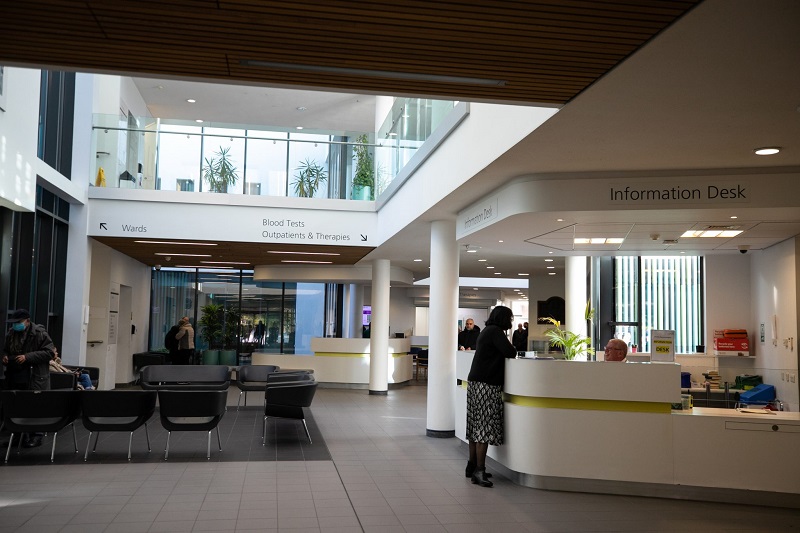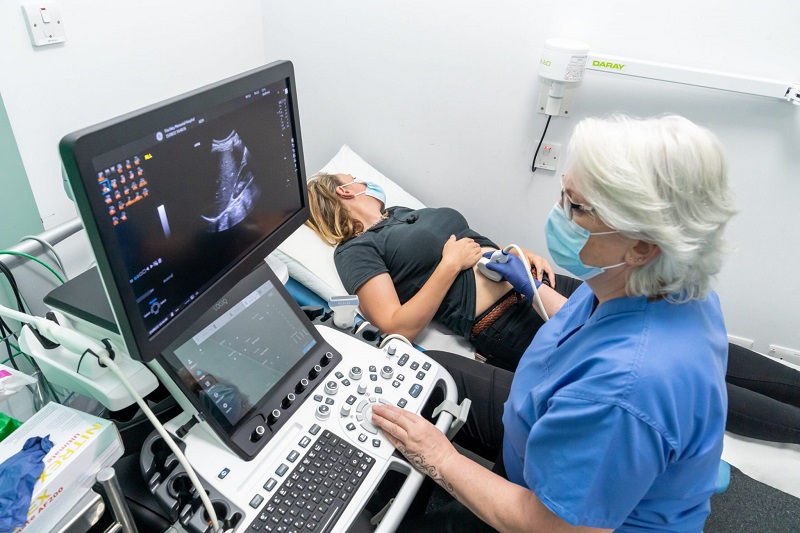Finchley Memorial Hospital Community Diagnostic Centre is an example of what can be achieved by working in partnership across an Integrated Care System (ICS) and linking additional diagnostic capacity into an existing, vibrant, and important local care facility to meet many of North Central London (NCL) ICS’s strategic priorities and the needs of local patients.
Community Health Partnerships (CHP), as the head tenant for the site, worked closely with North Central London Integrated Care System; the Royal Free London NHS Foundation Trust; LIFTCo, North London Estate Partnerships; and gbpartnerships consult to deliver the project.
Finchley Memorial Hospital (FMH) is an important NHS LIFT asset, which had opportunities to improve efficiencies and utilisation, and explore creatively how to rapidly scale up provision of new diagnostic services out of hospital.
Closer to home
It opened in July 2012 and is a multi-use community site bringing care closer to home for the residents of Barnet, Camden, Enfield, Haringey, and Islington.
Diagnostic services include CT, MRI, ultrasound, and ophthalmology scans, additional phlebotomy (blood tests), cardiology and respiratory tests, and vascular thermography.
Community Diagnostic Centres are a national imperative, a vital part of the Government’s plan to transform the way the NHS delivers tests, scans, and X-rays and ultimately reduce waiting times for patients.
In North Central London the commissioners and trust recognised that, with some minor adaptations, FMH could quickly be established as a CDC, with the benefits to patients and staff being rapidly realised.
Meeting the challenge
In 2021 the Government announced the rollout of CDCs, new one-stop-shops for checks, scans, and tests backed by a £350m investment to provide around 2.8 million scans and tests in the first full year of operation.
NCL ICS set up a CDC programme in early 2021, which set out to optimise the use of core assets and to invest in local care, supporting population health improvements as strategic priorities in delivering CDCs locally.
The solution
FMH was identified as a preferred location for a new Community Diagnostic Centre in North Central London following a full options appraisal.
And partnership working, delivery, capability, and flexibility of the existing good-quality estate have been critical factors in overcoming challenges and successfully delivering the CDC.
Space in a community location
Finchley Memorial Hospital is a core asset for the NHS in North Central London.
It is in an accessible community location with onsite car parking.
A key advantage of the property was its ability to deliver significant additional capacity, at pace, and in an accessible location.
Data and insight
FMH was identified as a preferred location for a new Community Diagnostic Centre (CDC) in North Central London following a detailed analysis of local health, both access and outcomes; demand; current service backlog; and system performance by partners from across the ICS.
CHP supported NHS partners to develop their CDC business case to secure national funding, providing data and cost estimates.
And, to date, the project has secured over £26m in capital and revenue funding to support the site’s development and the costs of operations.
Project delivery
CHP worked with its LIFT supply chain partners to deliver the design and construction elements of the programme.
The additional benefit of using the public private partnership is the local knowledge of the building and ongoing maintenance responsibility.
CHP’s developments team also used their cost estimator to inform early costings, saving time and setting cost expectations early.
Partnership working
Using a blend of in-house NHS delivery capability and access to a pre-procured supply chain, the partnership was able to work to deliver the necessary adaptations at speed.
The ICS ran the overarching governance and weekly project meetings to co-ordinate the various workstreams including clinical service project management and IT, which has been key to services going live for patients.
To date, the centre has delivered more than 80,000 additional tests to patients
Patients benefit
FMH CDC provides ease of access to diagnostic services in a community location.
And patient feedback has been good, with 100% of MRI patients saying they have had a positive experience.
The patient journey time through ophthalmology testing now averages 40 minutes, compared to 2-3 hours at hospital sites.
As of January this year, the CDC has delivered over 80,000 additional tests to patients referred from partner trusts, helping to address backlogs, while reducing waiting times for patients.
Increased capacity, delivered at pace
By operating out of an already-established local NHS facility, the FMH CDC project has been able to deliver significant additional diagnostic capacity at pace.
Diagnostic facilities available on the site now include MRI and CT scanning, non-obstetric ultrasound scans, phlebotomy, ophthalmology, physiological measurement tests around audiology, and respiratory and micro vascular tests.
Delivering on shared objectives
The partnership is focused on service improvement, cost reduction, and value for money in all aspects of the CDC design and it has made excellent progress in meeting its stated objectives.
Economies of scale are achieved by growing services that can utilise the same overheads and staff, thereby reducing costs per scan.
The focus on working creatively across the partnership to maximise the use of a core asset has increased FMH utilisation by at least 10% during the year.
This has been achieved at a o% increase in the ‘rent’ paid by the NHS, helping it to manage fixed overheads and bringing down the cost per scan.
Room sensors have also been installed at FMH, providing the potential to maximise room utilisation based on data in the next phase of improvements.
Resetting the relationship with public and private sector partners has enabled 500sq m of ‘new’ space to be created from the existing envelope for both current and proposed activity.
Phase two of the work is now underway to expand diagnostic services at the centre. This includes installing a second MRI and CT scanner, X-ray, and minimum respiratory tests.
This is expected to go live in September.
Diagnostic services include ultrasound, CT, MRI, ophthalmology scans, additional phlebotomy (blood tests), cardiology and respiratory tests, and vascular thermography
